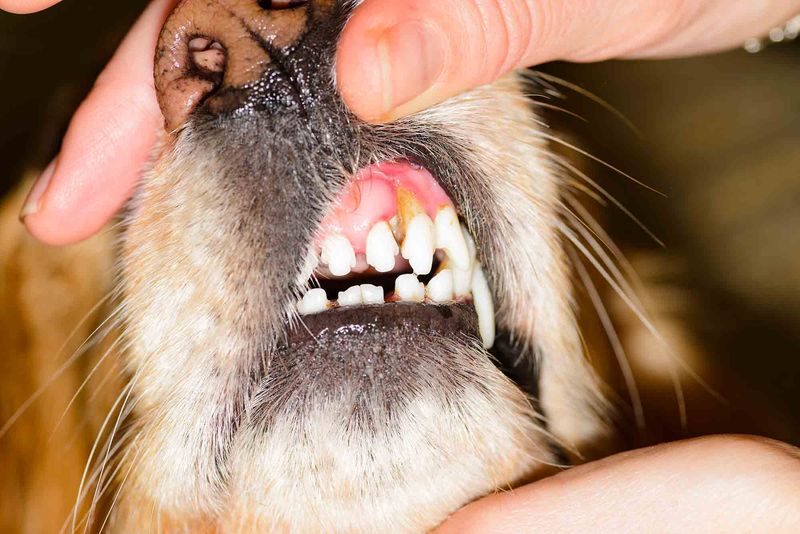Dogs are often considered beloved members of the family, yet their health issues can sometimes be overlooked. Here, we delve into ten common health problems that, despite being frequently encountered, are often ignored by pet owners. By understanding these issues, you can ensure your furry friend leads a happy and healthy life.
Dental Disease
The silent discomfort of dental disease often goes unnoticed in dogs. Owners may overlook bad breath, considering it normal. However, this can be a sign of periodontal disease. This condition can lead to significant pain and tooth loss if untreated.
Regular brushing and dental check-ups are vital. Dogs with neglected oral care may suffer more than just mouth issues. Bacteria from the mouth can enter the bloodstream, affecting the heart and kidneys.
Did you know? By age three, over 80% of dogs show signs of dental disease. Regular dental care can prevent this pervasive issue.
Obesity
Chubby dogs may look adorable, but obesity is a serious health concern. This condition strains joints, leading to arthritis and mobility issues. Obesity can also shorten a dog’s lifespan.
A balanced diet and regular exercise are keys to preventing weight gain. Owners often give in to those pleading eyes, offering extra treats. Moderation and discipline are crucial.
Interestingly, obesity is the most common preventable disease in dogs, affecting more than 55%. Regular vet check-ups can help tailor a diet plan suitable for your pet’s needs.
Ear Infections
Does your dog frequently shake its head? This could indicate an ear infection, a prevalent yet often ignored problem. Floppy-eared breeds are especially prone to this issue.
Moisture and wax buildup create an ideal environment for bacteria and yeast. Regular ear cleaning can prevent infections. If untreated, ear infections can lead to deafness and severe discomfort.
It’s surprising that nearly 20% of dogs suffer from ear diseases. Early detection and treatment make a significant difference, ensuring your pet’s comfort and health.
Allergies
Allergies in dogs can manifest in various ways, from itchy skin to gastrointestinal distress. Owners may mistake these signs for other issues, delaying proper treatment.
Environmental factors such as pollen or food ingredients are common culprits. Identifying the allergen requires patience and sometimes professional tests.
Did you know? Skin allergies are the most common reason for vet visits in dogs, affecting countless furry companions. Addressing allergies promptly can significantly enhance a dog’s quality of life.
Heart Disease
Heart disease in dogs is not just an age-related concern. Symptoms may go unnoticed until severe. Coughing, fatigue, and difficulty breathing are key indicators.
While some breeds are predisposed, lifestyle also plays a role. Regular vet visits are crucial for early detection and management.
Remarkably, one in ten dogs will develop heart disease in their lifetime. With advancements in veterinary medicine, many dogs live happily with proper care and medication.
Arthritis
Arthritis affects many senior dogs, causing pain and limited mobility. Subtle signs like reluctance to play or climb stairs often go overlooked by owners.
Joint supplements and a cozy resting place can alleviate discomfort. Weight management also plays a critical role.
Fascinatingly, arthritis can be managed effectively, allowing dogs to enjoy their golden years. Awareness and proactive care can make a world of difference for these loyal companions.
Hypothyroidism
Hypothyroidism is often misdiagnosed in dogs. It causes weight gain, lethargy, and a dull coat, but these symptoms can be mistaken for normal aging.
The thyroid gland’s reduced function impacts metabolism. Blood tests can confirm this condition.
Interestingly, breeds like Golden Retrievers and Dobermans are more susceptible. Medication and dietary adjustments help manage this condition, enhancing life quality and vitality.
Urinary Tract Infections (UTIs)
Urinary Tract Infections (UTIs) are painful yet often missed in dogs. Symptoms include frequent urination and thirst. Owners might attribute these changes to behavioral issues.
Prompt veterinary attention is essential for diagnosis and treatment. Cranberry supplements can support urinary health.
Did you know? Female dogs are more prone to UTIs than males. Understanding this can aid in early detection and relief from discomfort.
Diabetes
Diabetes in dogs requires careful monitoring. Symptoms like increased thirst and hunger are often overlooked. Insulin therapy and diet changes are primary treatments.
Owners must be diligent in recognizing signs early to prevent complications. Regular blood sugar checks are vital.
Interestingly, diabetes is more prevalent in older and obese dogs, much like in humans. With proper care, diabetic dogs can lead full, active lives.
Anxiety and Stress
Anxiety in dogs manifests in various forms, from destructive behavior to excessive barking. Changes in environment or routine are common triggers.
Behavioral training and calming products can ease stress. Owners should provide a secure space for their pets.
Remarkably, certain breeds like Collies are more prone to anxiety. Understanding these tendencies ensures a harmonious household and a contented pet.










